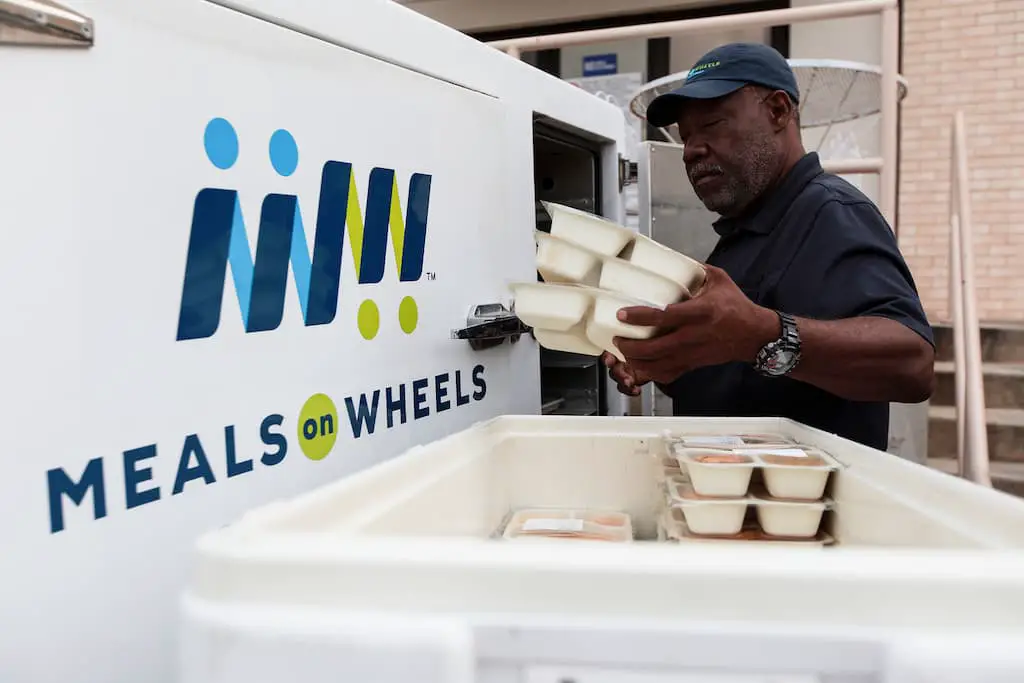Is Meals on Wheels Free in Texas?
Meals on Wheels is a vital nutrition program that provides nutritious meals to seniors across the United States. In Texas alone, over 50,000 seniors rely on Meals on Wheels to receive healthy, affordable meals each year. This community-based program not only provides nourishment, but also offers a vital lifeline and source of social connection for many isolated older adults.
For homebound, low-income, and disabled seniors in Texas struggling with food insecurity or unable to shop and cook for themselves, Meals on Wheels can truly be a lifesaver. These nutritious meals support seniors’ health and well-being, allowing them to remain independent at home for longer. However, Meals on Wheels relies heavily on volunteers and community donations, so eligibility requirements and costs can vary across Texas.
Is Meals on Wheels free in Texas? In Texas, Meals on Wheels is usually free of charge, but the cost can vary based on individual income, local provider’s budget, public funding, and requested client donations. While lower-income seniors generally receive the highest subsidies, the program does ask for voluntary contributions, typically between $1-5 per meal, depending on the client’s ability to pay.

In this article, we’ll explore everything you need to know about accessing Meals on Wheels services in Texas as a senior, from eligibility criteria to the application process and potential costs. With details on the types of meals provided, benefits of the program, and how you can lend support through volunteering or donations, this guide aims to answer the key question – is Meals on Wheels free for seniors in Texas?
What is Meals on Wheels and How Does It Benefit Seniors in Texas?
Meals on Wheels is a community-based program that provides regular, nutritious meal deliveries directly to homebound seniors who cannot shop or cook for themselves. In Texas, hundreds of local Meals on Wheels providers coordinate volunteers to deliver meals right to seniors’ doors, often providing a vital source of human connection and safety checks along with each meal.
Meals on Wheels aims to address food insecurity, malnutrition, and social isolation – all critical issues facing the rapidly growing elderly population in Texas. According to Meals on Wheels America, 17% of seniors in Texas are at risk of hunger. Regular, balanced Meals on Wheels can vastly improve seniors’ nutrition, allowing them to better manage medical conditions and maintain strength, mobility, and independence in their own homes.
Beyond the meals themselves, human contact with Meals on Wheels volunteers helps keep seniors engaged and feeling connected to their community. For those unable to easily leave home, these regular visits can provide reassurance, safety checks, and mental stimulation to brighten otherwise isolated days and nights. Meals on Wheels also partners with case workers to link seniors with additional assistance and resources as needed.
Is Meals on Wheels Free for All Seniors in Texas?
While the Meals on Wheels program aims to provide nutrition assistance free of charge to low-income seniors in greatest economic and social need, the reality in Texas is more complex. Whether fully subsidized or with a requested contribution, costs vary depending on the local provider, their funding model, and applicants’ financial status.
Some key factors impacting free vs. paid Meals on Wheels access include:
- Client Income: Lower income seniors typically receive highest subsidy for meals. Fees rise on a sliding scale as income increases.
- Provider Budgets: Heavily impacted by local funding and donations, available subsidy for fully free meals fluctuates.
- Public Support: State and federal funding helps offset costs but continues to fall short of growing demand.
- Client Donations: Some programs request voluntary “cost-share” donations from clients, typically $1-5 per meal.
No senior in need is turned away, but how much you pay depends on your local provider’s policies. Always ask about costs and subsidies when applying. For those struggling to contribute, needs-based assistance is usually available.
Who is Eligible for Meals on Wheels in Texas?
To qualify for Meals on Wheels assistance in Texas, seniors must meet certain criteria related to age, income status, and ability to prepare meals independently. Key eligibility requirements include:
- Age 60+: Meals on Wheels serves seniors aged 60 and older across Texas. Some programs may have additional age requirements.
- Homebound Status: Seniors must be largely homebound and unable to shop/cook reliably for themselves to receive home-delivered meals.
- Texas Resident: You must reside in a Texas community served by a local Meals on Wheels provider.
- Income Status: Though requirements vary, programs often prioritize low-income seniors most in need. Applicants must verify income and household size.
- Disability: Seniors with disabilities that restrict mobility or ability to shop/cook may qualify for assistance.
According to Meals on Wheels data, over 50% of recipients live at or below the federal poverty line. If you feel you or a loved one meets the above criteria for home-delivered meals in Texas, the next step is to reach out to your local program to apply. Eligibility is assessed individually by each provider.
What Types of Meals are Provided by Meals on Wheels in Texas?
The Meals on Wheels program strives to provide nutritionally balanced, diet-appropriate meals tailored to seniors’ needs. While exact menus vary, Texas providers offer hot, chilled, or frozen meals that typically include:
- Protein: Meat, poultry, fish, eggs, peanut butter
- Fruits & Vegetables: Fresh or frozen produce
- Grains: Breads, cereals, pasta
- Dairy: Milk, cheese, yogurt
- Beverage: Juice, milk, coffee, tea
Meals accommodate common senior dietary needs like diabetes, heart health, and low sodium. Culturally diverse menus, vegetarian/vegan options, and kosher or halal meals are usually available upon request. Special treats are often even offered on major holidays!
With nutrition a priority, Meals on Wheels provides vital variety and balanced nutrition that many homebound seniors in Texas otherwise lack access to.
How Can Seniors Apply for Meals on Wheels in Texas?
Applying for Meals on Wheels in Texas involves contacting your local provider agency and completing their eligibility process. Key steps include:
- Identify Your Provider: Over 100 providers operate across Texas’ communities.
- Call to Pre-Screen: Explain your needs and interest in applying. They will assess if you preliminarily meet eligibility criteria.
- Complete Paper or Online Application: You will need to provide demographic, health, and income/household details.
- Interview & Assessment: A case worker will interview you and assess your level of need if approved to move forward.
- Verify Eligibility: The program will verify your age, residence, income status, mobility status, and need.
- Get on the Schedule: Once approved, you will be added to the client roster and meal delivery schedule!
Reapplications are required annually or biannually. Report any changes in status immediately as this could impact your eligibility.
How Can Community Members Support Meals on Wheels in Texas?
Because Meals on Wheels relies so heavily on community backing, there are many ways Texans can lend support:
- Volunteer: Help deliver meals, assist in kitchens, provide admin help in local offices!
- Donate: Make a cash donation to your provider or set up a monthly giving program.
- Fundraise: Rally your school, business, or group to host a fundraiser.
- Advocate: Contact local and state representatives to advocate for senior nutrition funding.
- Refer Seniors: Help spread the word so more seniors in need can access this vital service!
With limited public funding, community support through volunteers and donations is truly the lifeblood of Meals on Wheels programs across Texas. Whether through direct involvement or spreading awareness, we all have a role to play in ensuring our aging neighbors can access the meals they need to thrive.
The high cost of senior living in Texas makes programs like Meals on Wheels even more vital. According to recent data, the average cost of senior living in Texas ranges from $2,500 to $4,000 per month. In 2023, the estimated average is approximately $3,998 per month, depending on factors like facility type, location, and amenities.
Many seniors rely solely on fixed Social Security income, so affording daily needs and medical care remains a struggle. Meals on Wheels helps fill an important gap by providing nutritious meals and personal contact to low-income seniors who could not otherwise afford paying thousands monthly for assisted living or nursing home facilities. Community support is crucial to help offset the costs of meal delivery and allow this lifeline to continue reaching Texas’ isolated, hungry seniors.
Conclusion
In a state with one of America’s fastest growing senior populations, Meals on Wheels provides a critical lifeline – delivering nutrition, friendship, and safety to hundreds of thousands of older, homebound Texans each year. The eligibility requirements, costs, and menus vary across Texas’ many local programs, but this community-powered network strives to ensure that no senior confronts food insecurity and isolation alone.
Texans young and old have many opportunities to get involved with Meals on Wheels through volunteering, donations, and advocacy. With a grassroots approach and the passion of its supporters, Meals on Wheels can continue strengthening communities across Texas – one nutritious, reliable senior meal delivery at a time.
Frequently Asked Questions
-
How did Meals on Wheels originate?
Since 1954, when the first Meals on Wheels was delivered to America by a few Philadelphians, we have been driven by one goal: to help our seniors live independently and to improve their health.
-
Is Meals on Wheels free in Texas?
Programs are offered at no cost and aim to enrich and nourish the lives of those we serve. They allow them to remain in their homes with dignity and autonomy. Meals on Wheels Central Texas, a nonprofit 501c3 organization, is locally run and independent.
-
What thin skinned means?
Thin skin is a condition that makes it difficult to take mild teasing or get upset by other people’s opinions.
-
How do you qualify for Meals on Wheels in PA?
You must be at least 60 years old. They must be incapable of cooking meals and live with someone who is capable. They must be incapable of shopping for their own food and live with someone who can.
-
How long has Meals on Wheels been around?
Meals on wheels was born from the canteens. The first ever organized nutrition program was thus born. The United States began its first experimental meal program after the war. In January 1954, Philadelphia was the first American city to offer home delivery.
-
What is the difference between a fast food restaurant and a restaurant?
Fast food can be more accessible for customers in a hurry than fast-casual restaurants, which are focused more on ambience and menu options. As many people eat their meals at home, think fast-moving kiosks or self-serve counters.
-
Who came up with Meals on Wheels?
Over 1,500 volunteers spent over 62,000 hours visiting the elderly and delivering food to them. After reading an article in the New York Times about elderly New Yorkers who had nothing to eat weekends or holidays, Gael Greene & James Beard started Citymeals-on-Wheels.
-
How much do Meals on Wheels cost NZ?
The cost of each meal is $10.80, plus tax. A referral is not required. Two meals per week is the minimum.
-
What are the 6 principles of a good menu planning?
For better food quality, it is important to plan household meals according to six principles: adequacy and balance, energy control, calorie management, nutrition density, moderation, variety, and adequacy.
-
Should you make your child clean their plate?
Sometimes children may not eat enough and sometimes they don’t want to eat another bite. It is not recommended to force children to eat everything on the plate, or enforce the “one bite” rule. Parents should allow children to learn how to eat on their own.
-
How much is Meals on Wheels Vic?
Meals on Wheels Victoria’s funding comes from member subscriptions (100 dollars per year) as well as a contribution of $5000 annually by the federal government. We have received funding to hire a state manager for the 2021/22 fiscal year.
-
How much does Meals on Wheels cost in Texas?
What is the cost of receiving meals? Eligible clients do not have to pay any fees, provided they have sufficient funding. However, clients can make voluntary contributions to help cover the cost of meals. A suggested contribution is $3.00 for each meal.
-
What is it called when you feed the homeless?
Publication October 17, 2021. A soup kitchen, by definition, is an area where food is provided for free (usually soup or bread) to those who are homeless and need it. These soup kitchens are often run by religious or charitable organizations, and staffed by volunteers.
-
Who originated Meals on Wheels?
Over 1,500 volunteers spent over 62,000 hours visiting the elderly and delivering food to them. After reading an article in the New York Times about elderly New Yorkers who had nothing to eat weekends or holidays, Gael Greene & James Beard started Citymeals-on-Wheels.
-
Does Texas have Meals on Wheels?
Texas Program Statistics More than 300 Texas-based home delivery meal service providers are available. Meals on Wheels Texas has more than 10,000 volunteers and employs more than 10,000 people. They deliver food to around 100,000 frail Texans every day.






